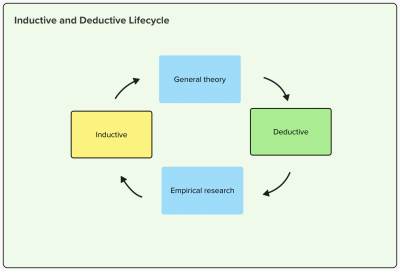Origin of Deductive and Inductive Approaches
Deductive Reasoning: Deductive reasoning originates from Ancient Greece and was primarily developed by Aristotle in his work Organon through the use of syllogisms. This approach involves starting from a general principle or theory and applying it to specific instances to derive conclusions.
Inductive Reasoning: Inductive reasoning, also traced to Ancient Greece, was notably advanced by Francis Bacon during the Renaissance in his work Novum Organum. This approach emphasizes empirical observation and generalization, involving deriving general principles from specific observations or experiences.
Comparison of Reasoning Approaches in Research
Inductive Approach (Induction): This approach involves researching to derive general theories from specific observations and is commonly used in exploratory research and qualitative studies.

Deductive Approach (Deduction): This approach involves testing existing theories by applying general principles to specific cases, often used in confirmatory research and quantitative studies.

Application to Professional Scrum
Deductive Elements in Scrum
Defined Structures and Rules: Provide a clear framework for Scrum teams to operate within.
Scrum Guide:
-
-
- Artifacts and their commitments: Product Backlog (Product Goal), Sprint Backlog (Sprint Goal), and Increment (Definition of Done).
- Events: Predefined five events: Sprint, Daily Scrum, Sprint Planning, Sprint Review and Retrospective
- Clearly defined roles, including Product Owner, Scrum Master, and Developers.
-
Inductive Elements in Scrum
Empirical Process Control: A cornerstone of Scrum that emphasizes learning and improvement through observation and experience. This approach leads to continuous improvements by integrating several key practices:
-
-
- Inspection: Involves regularly reviewing processes, teamwork, and results to identify areas for improvement.
- Adaptation: Adjusts processes and practices based on observations and feedback.
- Transparency: Ensures all aspects of the process are visible and understandable to the team.
-

The Importance of Inductive Elements in Professional Scrum
While many teams focus on the deductive aspects of Scrum for their clear guidelines, structure, and consistency, it is essential to recognize the critical role of inductive elements. Inductive aspects, such as continuous improvement and adaptation based on empirical feedback, are vital for effectively applying
Professional Scrum. Integrating these inductive elements enables teams to refine their practices based on real-world experiences dynamically. This approach fosters better collaboration and leads to more effective delivery of value to stakeholders and customers. By embracing both deductive and inductive aspects, Scrum teams can achieve a balance that maximizes their ability to adapt, improve, and ultimately succeed in delivering high-quality outcomes.

